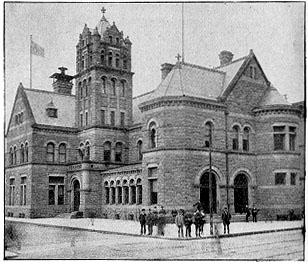Springfield, Massachusetts, by Clarence E. Blake, Ph.D., continued.
 Left: Springfield Republican Building Left: Springfield Republican Building
Society I would forward the fugitive to other parts; as United States commissioner I would then issue a warrant for his arrest." It was like the Federal marshal in Boston, who would go to Garrison or Phillips for information about a fugitive slave for whose arrest he had a warrant. "I want a negro who is hiding in this vicinity. It is my duty to arrest him; and if you happen to know where he is, I wish you would tell me. You will be likely to know something of his whereabouts." The famous Dred Scott case had a curious connection with Springfield. Mrs. Emerson, the widow of Scott's owner, had married Dr. Chaffee, a Congressman from Springfield. The slave and his family had lived in St. Louis for years in practical freedom. But the doctor's political enemies made use of the relation for all it was worth. The Chaffees had never laid claim to the property; but to silence clamor, they issued a quitclaim instrument in favor of the Scotts, and ordered a St. Louis attorney to execute manumission papers in their behalf.
 Right: United States Custom House and Post Office. Right: United States Custom House and Post Office.
Springfield's part in the incidents clustering about the nomination of Lincoln must not pass unnoticed here. George Ashmun was one of the most gifted members of the local bar, and a zealous political worker. He was a member of the famous Chicago Convention of 1860. Through the agency of Mr. Bowles, he was made chairman of the convention. He had previously fallen into disfavor as a leader of the Whigs. Through the organizing ability of Mr. Bowles, he was suddenly elevated to a position of commanding influence in the new political party. It was fitting that Massachusetts should be the state chosen to raise the banner in this convention; and of all her delegates, none was better fitted by wide acquaintance, ability, and honorable record than George Ashmun, Springfield's honored son, for the prominent place given him. Amid tremendous cheers he was escorted to the chair by Carl Schurz and Preston King. It was Mr. Ashmun, accompanied by Mr. Bowles and a committee, who conveyed the formal notice of his nomination to Mr. Lincoln at Springfield, Ill. But George Ashmun's work had only begun. After the election that made Lincoln the nation's choice, an anxious people was waiting to hear from the defeated Douglas. It was a time of
-- Page 7 --
© Laurel O'Donnell 1998 - 2005, all rights reserved
This document may be downloaded for personal non-commerical use only
and should not be reproduced or distributed without permission.
|
 Left: Springfield Republican Building
Left: Springfield Republican Building
 Right: United States Custom House and Post Office.
Right: United States Custom House and Post Office.